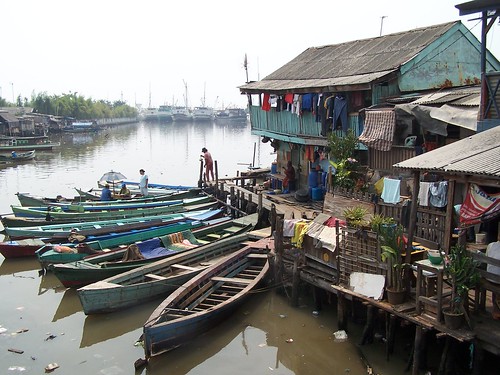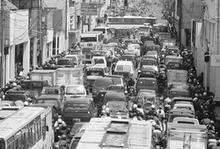Improving Neighborhood Quality of Slums
This post is to applaud a program initiated by Mercy Corps Indonesia that aims at improving the neighborhood quality of slums in North Jakarta. The program is called Healthy Places, Prosperous People (HP3) or Lingkungan Sehat Masyarakat Mandiri.
The program is funded by the International Development Research Centre (IDRC) and supported by the Urban and Regional Development Institute or (URDI), the USAID-funded Environmental Services Program (ESP), and SwissContact. The program encourages the poor in slums to work closely with the local government in addressing water supply, sanitation and solid waste issues.
On June 14, 2007, the Jakarta Post reported that the residents of North Jakarta's Penjaringan slum exhibited photos of garbage in their community and the children's drawings about the slum environment.
In the exhibit, one of Penjaringan slum residents said, "I took this picture because I want to show other people who usually ignore the garbage collectors. People in my neighborhood don't bother about dumping the garbage in the right place, which is quite far away,"
Such comments show how the program is able to increase his awareness about the environmental problem in his neighborhood. The comments also indicate that he is eager to encourage his neighbors to improve the quality of their neighborhood.
This is a good example of how a community-based program works and addresses environmental problems in the slum neighborhoods. The Mercy Corps Indonesia initiates the program but then let the poor work closely each other to address their problems. The slum residents' willingness to improve their neighborhood is the most important factor of the success of a community-based program in addressing environmental problems in the slum neighborhoods.
The funding from the program without high participation of the slum residents will not effectively address the problem. The funding should be just a trigger to engage the residents in addressing their problem. The program should be designed to encourage the slum residents to actively engage in addressing their problem and then to facilitate their engagement with resources from outside of their neighborhoods. Such program will empower the slum residents and will sustain with empowered slum residents.
Many researchers indicate the importance of residents’ participation in upgrading slum neighborhoods. In many cases of slum upgrading program,officials did not engage with residents and the program was not assuccessful as it might have been. In those cases, the residents did not fully participate in the program and they had little interest in maintaining the new facilities that were built through the program for the residents. Instead, the residents felt that the new facilities had been imposed on them. The residents abandoned the facilities and theneighborhood quality stayed poor. Such program had no impact on the environmental quality and poverty in slum neighborhoods.
Not only the HP3 program does address the environmental problems in the slum neighborhoods but also generates economic activity in the neighborhoods. Such economic activity will contribute in alleviating poverty in the slum neighborhoods. The improved quality and reduced poverty in the slum neighborhoods will gradually be materialized as the results of the HP3 program. That's why the HP3 program should be applauded and the Mercy Corps Indonesia should be rewarded.
(This post was also linked at The International Development Research Center)
The program is funded by the International Development Research Centre (IDRC) and supported by the Urban and Regional Development Institute or (URDI), the USAID-funded Environmental Services Program (ESP), and SwissContact. The program encourages the poor in slums to work closely with the local government in addressing water supply, sanitation and solid waste issues.
On June 14, 2007, the Jakarta Post reported that the residents of North Jakarta's Penjaringan slum exhibited photos of garbage in their community and the children's drawings about the slum environment.
In the exhibit, one of Penjaringan slum residents said, "I took this picture because I want to show other people who usually ignore the garbage collectors. People in my neighborhood don't bother about dumping the garbage in the right place, which is quite far away,"
Such comments show how the program is able to increase his awareness about the environmental problem in his neighborhood. The comments also indicate that he is eager to encourage his neighbors to improve the quality of their neighborhood.
This is a good example of how a community-based program works and addresses environmental problems in the slum neighborhoods. The Mercy Corps Indonesia initiates the program but then let the poor work closely each other to address their problems. The slum residents' willingness to improve their neighborhood is the most important factor of the success of a community-based program in addressing environmental problems in the slum neighborhoods.
The funding from the program without high participation of the slum residents will not effectively address the problem. The funding should be just a trigger to engage the residents in addressing their problem. The program should be designed to encourage the slum residents to actively engage in addressing their problem and then to facilitate their engagement with resources from outside of their neighborhoods. Such program will empower the slum residents and will sustain with empowered slum residents.
Many researchers indicate the importance of residents’ participation in upgrading slum neighborhoods. In many cases of slum upgrading program,officials did not engage with residents and the program was not assuccessful as it might have been. In those cases, the residents did not fully participate in the program and they had little interest in maintaining the new facilities that were built through the program for the residents. Instead, the residents felt that the new facilities had been imposed on them. The residents abandoned the facilities and theneighborhood quality stayed poor. Such program had no impact on the environmental quality and poverty in slum neighborhoods.
Kampung in North Jakarta, originally uploaded by kristineinindonesia.
The HP3 program also initiates a recycling program for organic and non-organic in the slum neighborhoods. The recycling program encourages residents to compost garbage into fertilizer and make bags, pencil cases and other useful objects from used paper and plastic. As reported by the Jakarta Post, another slum resident commented, "I'm very enthusiastic about the recycling program because I can make something useful from the garbage. I hope the garbage will gradually disappear from the area, and our community will no longer be called a slum."Not only the HP3 program does address the environmental problems in the slum neighborhoods but also generates economic activity in the neighborhoods. Such economic activity will contribute in alleviating poverty in the slum neighborhoods. The improved quality and reduced poverty in the slum neighborhoods will gradually be materialized as the results of the HP3 program. That's why the HP3 program should be applauded and the Mercy Corps Indonesia should be rewarded.
(This post was also linked at The International Development Research Center)






1 comment:
nice post
Post a Comment